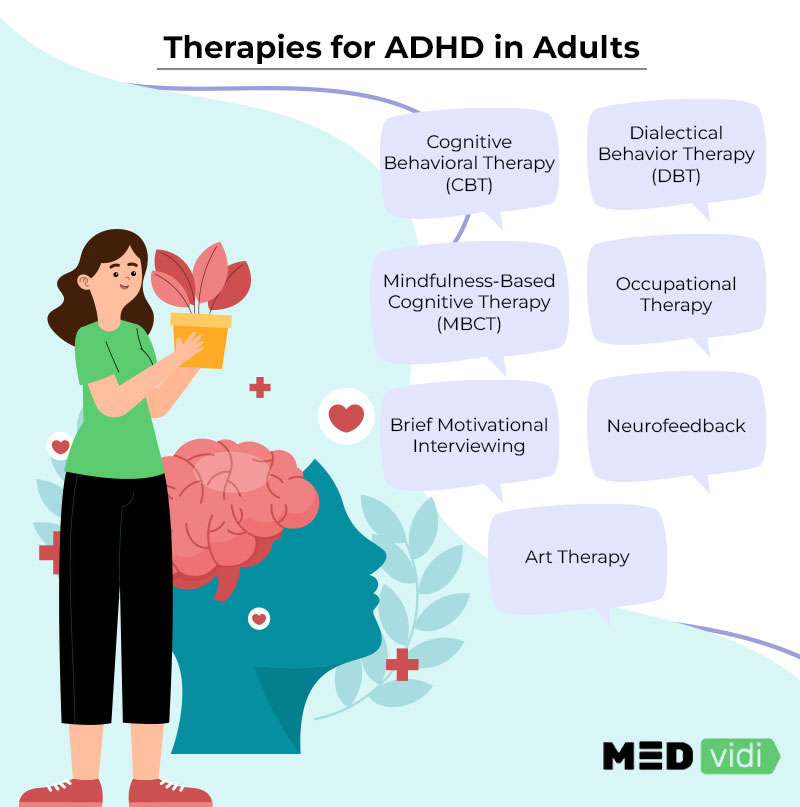Checking Out Effective ADHD Therapy Choices for All Ages
The intricacies of Attention Deficiency Attention Deficit Disorder Problem (ADHD) present distinct challenges throughout different age groups, demanding an extensive expedition of efficient therapy options. A combination of behavior therapies, medicinal interventions, and way of life modifications has actually revealed promise in resolving the diverse demands of individuals with ADHD.
Understanding ADHD and Its Influence
Attention-Deficit/Hyperactivity Disorder (ADHD) is a neurodevelopmental problem identified by relentless patterns of inattention, attention deficit disorder, and impulsivity that can dramatically affect different elements of a person's life. It normally shows up in childhood years, although signs and symptoms can persist into adulthood. The core signs of ADHD can interrupt instructional efficiency, prevent social interactions, and make complex work undertakings.
Individuals with ADHD typically have problem with maintaining concentrate on jobs, organizing tasks, and following via on directions, which can bring about academic underachievement (Depression Treatment). In social contexts, impulsivity may result in difficulties in forming and maintaining connections, as individuals may interrupt discussions or make hasty choices without thinking about consequences
In addition, ADHD can co-occur with various other psychological wellness conditions, such as stress and anxiety and depression, even more making complex medical diagnosis and treatment. The irregularity in signs and symptom presentation suggests that ADHD can impact people differently, necessitating a customized approach to monitoring. Comprehending ADHD's diverse effect is crucial for developing effective methods that sustain individuals in browsing day-to-day difficulties and achieving their possibility. Comprehensive recognition of ADHD's nature and ramifications lays the foundation for exploring suitable therapy choices tailored per person's requirements.
Behavioral Therapies for ADHD
Various behavioral therapies have been developed to efficiently resolve the challenges connected with ADHD, concentrating on changing certain behaviors and promoting necessary abilities. Among the most recognized strategies are cognitive-behavioral therapy (CBT), moms and dad training, and social skills training.
CBT aids people determine and transform negative idea patterns and behaviors, advertising a much more favorable expectation and improved self-regulation. This therapy usually consists of functional methods for managing impulsivity and enhancing company. Moms and dad training programs empower caretakers by equipping them with strategies to reinforce favorable actions and established constant boundaries, which can be specifically helpful for children with ADHD.
Social skills training is another crucial component, mentor people with ADHD how to connect efficiently with peers - Depression Treatment. This strategy usually involves role-playing and comments to boost communication, collaboration, and dispute resolution skills
Incorporating these behavior modifications into an extensive treatment strategy can considerably enhance functioning and lifestyle for people with ADHD. Eventually, the efficiency of these treatments depends upon tailored methods that consider the one-of-a-kind requirements of everyone, consequently cultivating resilience and adaptability in day-to-day live.
Medicine Options Available
For numerous people with ADHD, medicine can play a considerable function in taking care of symptoms and improving overall performance. The 2 main categories of medications suggested for ADHD are energizers and non-stimulants.
Stimulants, such as methylphenidate and amphetamine-based medications, are the most generally used treatments. These medications work by boosting the degrees of neurotransmitters, particularly dopamine and norepinephrine, in the brain, which helps improve focus and reduce impulsivity and attention deficit disorder. They typically generate fast outcomes, making them a recommended option for several individuals.

It is vital for medical care providers to carry out an extensive analysis to establish the most proper medication based on private needs, case history, and prospective adverse effects. Regular follow-up and surveillance are additionally vital to make certain the performance of the picked treatment and to make any kind of needed adjustments.
Way Of Life Changes to Consider
Managing ADHD effectively expands past medicine, as way of life modifications click here to find out more can dramatically enhance overall wellness and sign control. Integrating structured routines is critical; regular schedules assist people with ADHD manage their time successfully and lower sensations of bewilder.
Routine physical activity is an additional vital element. Exercise not just aids to enhance concentration however also boosts state of mind and decreases tension levels. Activities such as yoga exercise or team sports can be specifically useful, advertising both fitness and social communication.
Nourishment likewise plays a pivotal duty. Depression Treatment. A balanced diet abundant in omega-3 fatty acids, entire grains, and lean healthy proteins can contribute to enhanced focus and cognitive feature. Restricting sugar and processed foods is recommended, as these can worsen attention deficit disorder and impulsivity
Rest health is essential for taking care of ADHD symptoms. Establishing a regular sleep routine and producing a relaxing setting can boost sleep quality, causing better interest and psychological regulation.
Alternate and Alternative Strategies
Alternative and alternative approaches to ADHD therapy provide a varied array of options that complement traditional techniques. These approaches frequently concentrate on way of life modifications, nutritional interventions, and restorative practices that aim to enhance general well-being while resolving ADHD signs and symptoms.

Mindfulness and behavior modifications are likewise getting traction as all natural treatments. Practices such as yoga exercise, reflection, and cognitive-behavioral therapy can cultivate self-regulation and improve focus. These approaches sustain emotional durability, which is particularly helpful for individuals with ADHD.
Natural supplements, such as ginkgo biloba and ginseng, are sometimes checked out; nonetheless, it is important to speak with health care specialists prior to integrating these into therapy strategies. While choice and all natural methods can supply valuable support, they should preferably be made use of along with evidence-based therapies to attain optimal outcomes for taking care of ADHD across all ages.
Conclusion
In summary, reliable ADHD treatment requires an extensive technique that consists of behavioral treatments, medicine, lifestyle alterations, and all natural approaches. Customized interventions can dramatically enhance people' operating and lifestyle, while proper useful reference drug guarantees ideal symptom management. Furthermore, taking on structured routines, engaging in regular exercise, and find out practicing mindfulness can enhance emotional policy and focus. This multifaceted approach underscores the significance of personalized care in attending to the varied needs of people with ADHD across every age teams.